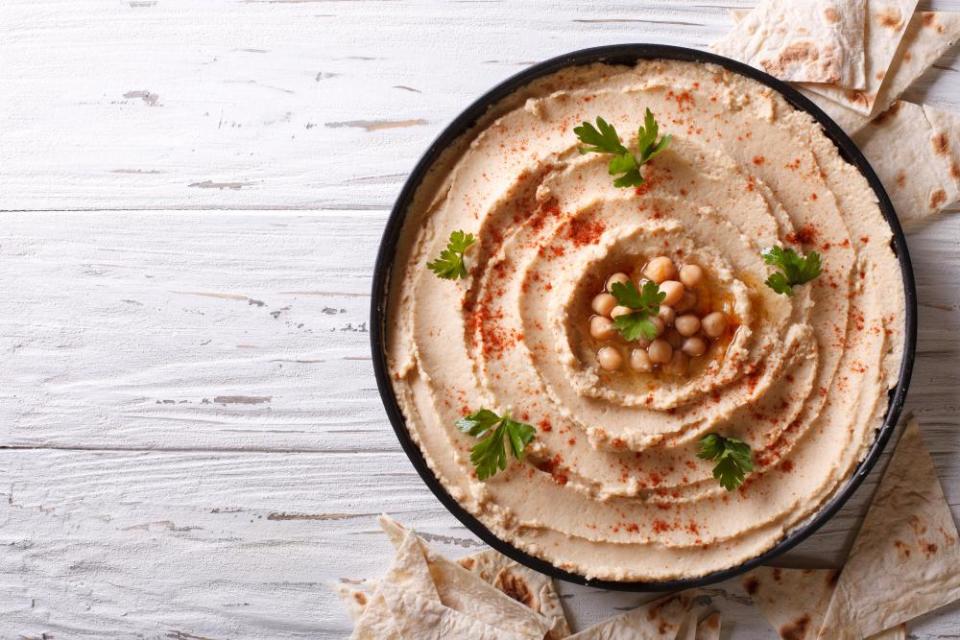Hummus 'crisis' sheds light on secret world of mass food production

Inside a cluster of unremarkable industrial units off the A40 in west London is the epicentre of the 2017 hummus crisis. The buildings belong to Bakkavor, the international food manufacturer behind the mass withdrawal of the product from British supermarket shelves after customers complained of a metallic taste.
These units off the Hanger Lane gyratory system – among 30 facilities on 19 different UK sites – manufacture hummus and other dips on an industrial scale for supermarket giants including Tesco, Sainsbury’s, Marks & Spencer, Waitrose, the Co-op, Asda and Morrisons, who sell them under their own brands.
The little-known Bakkavor – set up 30 years ago in Iceland by brothers Ágúst and Lýdur Gudmundsson – is the UK’s leading provider of fresh prepared foods. Hummus is made on the Hanger Lane site, in a sectioned-off production area in the equivalent of the savoury dip nerve centre. The problem began after a batch of the product, made with imported chick peas, was found to have an uncharacteristic metallic tang. It had already been despatched in tubs, prompting Bakkavor to write to all its supermarket clients to warn of a problem with the manufacturing process.
Marks & Spencer and Sainsbury’s both cleared some lines from their shelves after what Sainsbury’s described as “taste issues”. Bakkavor admitted there was a strange taste, but stressed there was no food safety issue.
A spokesman for the Food Standards Agency said: “We’re seeking confirmation that this withdrawal was done on quality rather than safety grounds, and the information we’ve received so far shows there is no indication of a food safety concern. The FSA hadn’t been notified about this withdrawal, but food businesses only need to make us aware of withdrawals if they are for food safety reasons.”
It has not been made clear what caused the metallic taste but in foods and beer it can be caused by chemical reactions affecting lipids, fat contained in olive oil, which is an ingredient of tahini and a key component of hummus. This would usually be the result of a combination of two types of reaction – hydrolysis and oxidisation – according to the book Advances in Meat, Poultry and Seafood Packaging, published by Woodhead Publishing.
But the Scandinavian supermarket Sevan, which has also removed hummus from its shelves in recent weeks due to a mystery taste, put forward a different theory. The chain told Food Quality News it believed the unusual flavour came from chickpeas imported from Canada.
Whatever the reason for the metallic tang, the UK shortages have had a knock-on effect for other retailers, as disappointed shoppers flocked to buy up their stock. Stocks have since been replenished and supermarkets say it is business as usual on the hummus front.
But the sudden shortage has led to scrutiny of the the low-key and inevitably secretive world of mass food production, which takes place daily in similar buildings across the UK. Supermarkets routinely use the same suppliers to make similar products, although recipes are kept secret and all equipment is deep-cleaned between each rival production run.
Derbyshire-based Matthew Walker, for example, turns out 26m Christmas puddings a year for all the major supermarkets and brands – from German discounters such as Lidl and Aldi through to Harrods and Waitrose. Similarly Mr Kipling – part of the Premier Foods group – makes mince pies and other cakes not only for its own-brand label but also for the UK’s major supermarkets and retailers.
Talk of a crisis emerged amid Britons’ apparently insatiable appetite for hummus. A survey in 2013 marked Britain as the hummus capital of Europe, with 41% of people having pots in the fridge – almost twice as many as in any other country.
A far-sighted Waitrose was the first British supermarket to stock hummus in the 1980s, with others following in the next decade. Chefs such as Yotam Ottolenghi, Claudia Roden and the Lebanese chef and author Anissa Helou have done much to popularise Middle Eastern foods in recent years, with shoppers now viewing hummus as a grocery staple. Fast-expanding supermarket ranges now include everything from reduced fat pastes to new-style versions made with beetroot or edamame beans.
“It’s good that hummus has become so popular in the UK, although in the Middle East it’s not a dip eaten from a tub but a meal – and people often don’t know how a really good one tastes,” Ottolenghi told the Guardian. “You can now buy hummus at various levels and you can also make it yourself, which is what I recommend.”
Nick Saltmarsh, founder of Hodmedod, which works closely with British farmers to produce homegrown grains and pulses, including fava beans, haricot beans and quinoa, said the situation “highlights, very sadly, the obscurity of our food system in the UK – so many people don’t know where our food comes from, never mind what’s in it and how it’s made”. Saltmarsh’s Suffolk-based company is currently working with the condiment firm Charlie & Ivy’s to launch a new fava bean hummus (using UK rapeseed rather than olive oil) at a food festival at the end of May. His UK-grown products have the backing of top chefs such as Ottolenghi, Mark Hix and Hugh Fearnley-Whittingstall.
“Hummus is one of our most popular dips,” says Joanna Black, hummus buyer at M&S. “As the trend for eastern Mediterranean-style foods and eating has grown, so has the demand for hummus. It’s no longer seen as an exotic food, but a more everyday item that customers are very familiar with.”
But if there is one lesson from the shortlived hummus furore, it is to diversify your supply chain. Pret a Manger – now enjoying massive sales of hummus as a result of its new vegetarian and vegan menus – uses a different supplier and was completely unaffected.

 Yahoo Finance
Yahoo Finance 